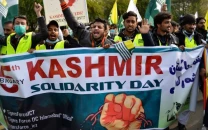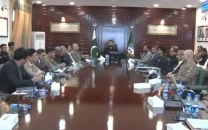Sixth population census to be conducted in March 2016: CCI
While conducting a census after every 10 years is a constitutional obligation, the last one took place in 1998

PHOTO: STOCK IMAGE
The CCI further decided that the housing and population censuses would be conducted at the same time.
Headed by the prime minister, the CCI is the highest decision-making forum between the federation and federating units of Pakistan.
While conducting a population census after every 10 years is a constitutional obligation, the last census took place in 1998. Back in 2010, the CCI had decided to conduct a population census in 2011 but the decision could not be implemented by the previous Pakistan Peoples Party government.
During the last government’s tenure, house listing – which is a component of the population census – was completed in 2011. But the exercise of population census was delayed on one pretext or the other.
Earlier, it was reported the ruling Pakistan Muslim League-Nawaz had decided against conducting the population count for fear of unrest following its results.
Read: Long-delayed count: Govt drops census plan for fear of backlash
The CCI, which met after a delay of around six months, does not have the issue of population census formally on its agenda, according to an official of the ministry concerned.
Read: Headcount: CCI likely to decide new census strategy
Holding the CCI meeting after such a long time is itself a violation of the Constitution, as under article 154, it must converge once in three months.
Prime Minister Nawaz Sharif had approved the census plan a few months ago. Since electoral rolls in the country are updated each time on the basis of the last census, the Election Commission of Pakistan (ECP) wanted to carry out the much-needed delimitation of constituencies for the national and provincial assemblies before the next general election is due in 2018.
The first census in Pakistan was conducted in 1951, the second in 1961, and the third in 1972 instead of 1971 due to political turmoil. The fourth census was held in March 1981 and fifth, which was due in 1991, was conducted in March 1998.
The census is deemed to be one of the most basic elements for the judicious distribution of resources, representation in Parliament, electoral processes, tax collection and other civic issues, including growing urbanisation and evaluation of resources for infrastructure development.



















COMMENTS
Comments are moderated and generally will be posted if they are on-topic and not abusive.
For more information, please see our Comments FAQ